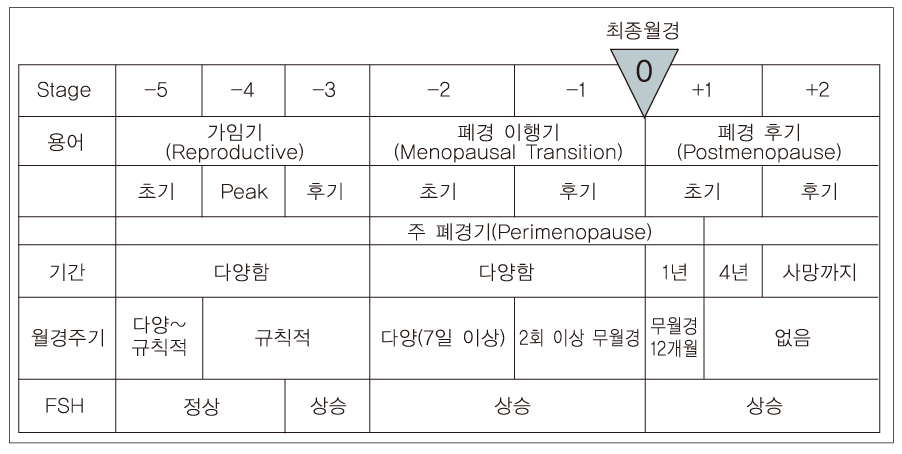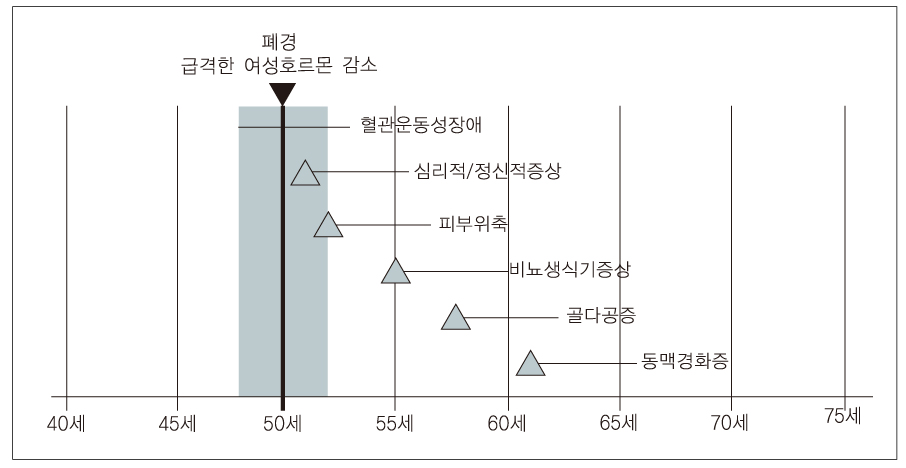J Korean Med Assoc.
2006 Jan;49(1):4-10. 10.5124/jkma.2006.49.1.4.
Perspectives for Managing Menopause: General Introduction
- Affiliations
-
- 1Department of Family Medicine, Sungkyunkwan University School of Medicine, Samsung Cheil Hospital, Korea. doctor4u@dreamwiz.com
- KMID: 2184631
- DOI: http://doi.org/10.5124/jkma.2006.49.1.4
Abstract
- Menopause is very important for women causes of many health problems are related. Hormone Replacement Therapy (HRT) is so common to treat symptoms of menopause. It is important that benefits and harms of HRT based on scientific evidence should be considered when prescribing HRT. The health care workers should prepare themselves for a better dialogue with women including information about alternative treatment. Beneficial effects of HRT on vasomotor symptoms have been supported by various studies, but HRT to treat negative mood is not recommended. Estrogens and androgens have significant beneficial effects on skin collagen, but do not prevent the effect of aging on elastic tissue and have limited use in the prevention and treatment of skin changes of menopause. Short-term benefits have been shown for urogenital atrophy. Recent evidences suggest that benefits of HRT include prevention of osteoporotic fractures, and colorectal cancer while prevention of dementia is uncertain. Harms include Coronary Heart Disease (CHD), stroke, thromboembolic events, and breast cancer, with 5 or more years of use. Active living, alternative therapies and consumption of food rich in phytoestrogens are some areas, which need to be explored in more detail. Patient preferences as well as evidence are important to initiate and/or continue HRT. Treatment choice should be based on up-to-date information and targeted to individual women's needs. HRT still offers the potential for benefit to outweigh harm, providing the appropriate regimen has been instigated in terms of dose, route and combination.
Keyword
MeSH Terms
-
Aging
Androgens
Atrophy
Breast Neoplasms
Collagen
Colorectal Neoplasms
Complementary Therapies
Coronary Disease
Delivery of Health Care
Dementia
Elastic Tissue
Estrogens
Female
Hormone Replacement Therapy
Humans
Menopause*
Osteoporotic Fractures
Patient Preference
Phytoestrogens
Skin
Stroke
Androgens
Collagen
Estrogens
Phytoestrogens
Figure
Reference
-
1. Soules MR, Sherman S, Parrott E, Rebar R, Santoro N, Woods N, et al. Executive summary: Stages of Reproductive Aging Workshop(STRAW) Park City, Utah July 2001. Menopause. 2001. 8:402–407.
Article3. Writing group for the Women's health initiative investigators. Risks and benefits of estrogen plus progestin in healthy postmenopausal women: principal results from the Women's Health Initiative randomized controlled trial. JAMA. 2002. 288:321–333.4. Naftolin F, Schneider HP, Sturdee DW, Birkhauser M, Brincat MP, Gambacciani M, et al. Guidelines for hormonal treatment of women in menopausal transition and beyond. Climacteric. 2004. 7:8–11.
Article5. North American Menopause Society. Recommendations for estrogen and progestogen use in peri and postmenopausal women: position statement of the North American Menopause Society. Menopause. 2004. 11:589–600.6. Skouby SO, Al-Azzawi F, Barlow D, Calaf-Alsina Erdogan Ertüngealp J, Gompel A, Samsioe G, Stevenson JC, et al. Climacteric medicine: European Menopause and Andropause Society(EMAS) 2004/2005 position statements on peri- and postmenopausal hormonal replacement therapy. Maturitas. 2005. 51:8–14.
Article7. Mendelsohn ME, Karas RH. Molecular and Celluar basis of cardiovascular gender differences. Science. 2005. 308:1583–1587.
Article



